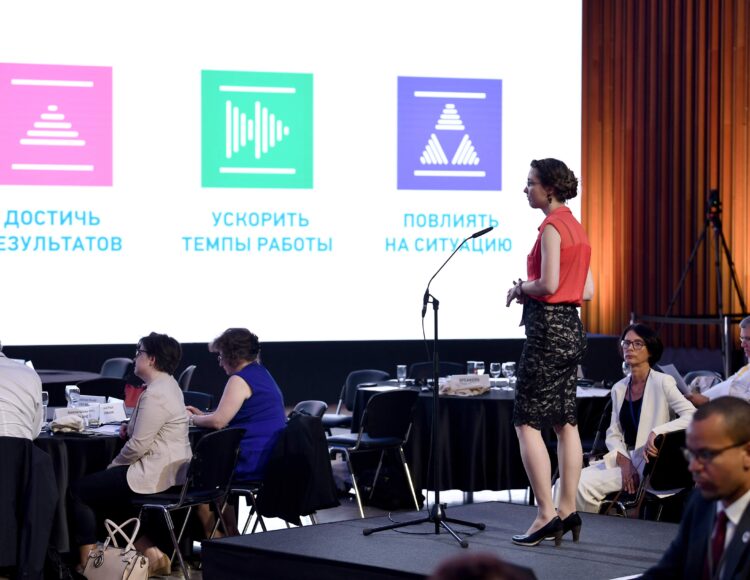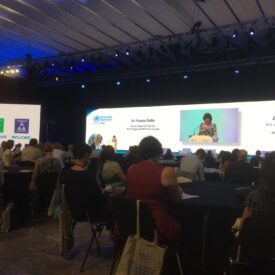Between 11 and 12 June 2019, Housing Europe was invited to a High-level Conference on Health Equity, organised by the WHO Europe in Ljubljana, Slovenia. Our Policy Officer, Edit Lakatos participated and reports.
The event was organised with the aim to provide evidence and information on the solutions that can be implemented to reduce health inequalities and accelerate progress towards better health, well-being and prosperity for all in the European region. It illustrated how shifting from fragmented approaches to integrated solutions deliver rapid and sustainable improvements in health for all.
The Conference also presented a WHO Interim Report that summarizes the 5 essential conditions needed to live a healthy life, showing how addressing these can transform the lives of those being left behind while increasing everyone’s well-being and prosperity. Among them one reads ‘living conditions’, which according to WHO Interim Report is responsible for 29% of the health inequity between the most and least affluent 20% of a country population. Under ‘living conditions’ the WHO Report mentions:
- housing deprivation
- fuel deprivation
- lack of green space
- unsafe neighbourhood
- overcrowding
- low air quality
- food deprivation
The Report stresses that ‘Housing is more than where you live: it provides a sense of belonging, and feelings of safety, security and privacy.’ In fact, insecure housing generates stress and WHO reports that every year, more than 100 000 deaths occur in the WHO European Region as a result of inadequate housing conditions.
The Report also finds that countries with lower expenditure per head on housing and communities tend to have larger gaps in severe housing deprivation, yet a quarter of the countries in the Region have decreased their expenditure per head on housing and community amenities since 2000.
In terms of the policy recommendations, the Interim Report puts a strong emphasis on points like:
- Increase public expenditure on housing and community amenities
- Increase the availability of good-quality- affordable new homes benefits the health of everyone. When policy makers invest in the provision of new housing in low-resource areas and involve local people and communities in the development process, this produces accelerated effect in terms of helping to reduce health inequities for those falling behind.
- Setting standards, though laws and regulations together with incentives-including subsidies for homeowners and landlords to improve housing availability, affordability, tenure and quality-are effective solutions to reducing health inequalities.
Policies aiming to increase affordability of homes with fuel-efficient heating systems and indoor sanitation facilities are key to reducing inequities in mental health, respiratory diseases and waterborne infections across social gradient.
During the conference parallel workshops also took place which gave the opportunity to show how countries can make real progress in reducing gaps in health and well-being, even within government electoral cycles. This underscores the need to systematically ensure that social values such as solidarity, equity and inclusion have a place in the fiscal and growth decisions made within and between countries and by transnational bodies. Among other civil society organisations, Social Platform also participated.
During the workshop on adequate living conditions, Edit Lakatos presented the newest projects of Housing Europe Members related to health and independent living such as the Pflege@Quartier and the integrative living project for Roma families by GESOBAU AG, Berlin and the social counselling projects for all residents by BO-VEST, Glostrup, Denmark. You may find her presentation at the end of this article.
Background
The call to address health equity, gender equality and the right to the highest attainable standard of health has become more urgent. Across the WHO European Region, average life expectancy is increasing and infant mortality is falling, and yet health inequities within countries persist.
Equity in health is a fundamental value of the Health 2020 European health policy framework and is prominent in the 2030 Agenda for Sustainable Development, which urges countries to leave no one behind. Moreover, WHO’s General Programme of Work for the next 5 years seeks to ensure the highest attainable state of health for all and universal health coverage.
All countries in the Region have strengthened the integration of the determinants of health into wider government policies and plans through multi-sectoral working groups and committees at all levels, from local to national. But changes in policies that affect health determinants such as work and social protection, often in response to the global financial crisis, have left more people at risk of income and employment insecurity.
Despite worrying trends, findings of HESR reveal that within-country differences in mental health, well-being and life-limiting illness can be reduced even in the short term (2 to 6 years) through proportionate universal policies and engagement with communities and those being left behind.
In this context, and with this new evidence, WHO/Europe brought together Member States, international organizations and civil society to identify and discuss ways to accelerate progress towards health equity.


